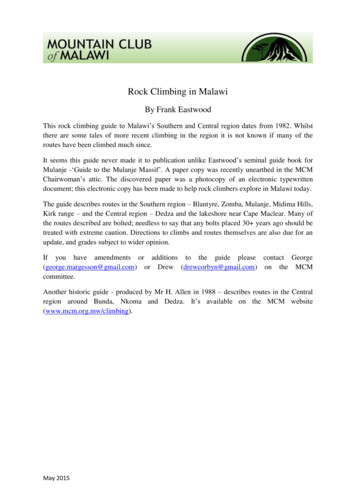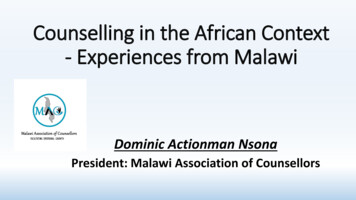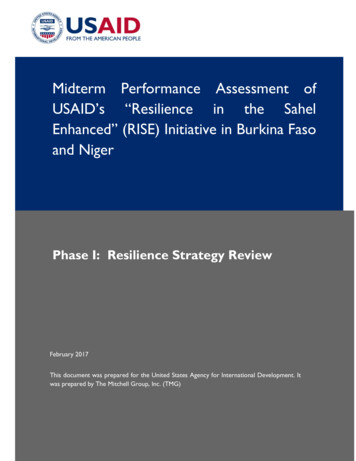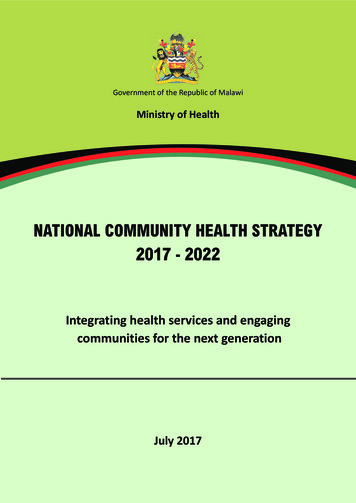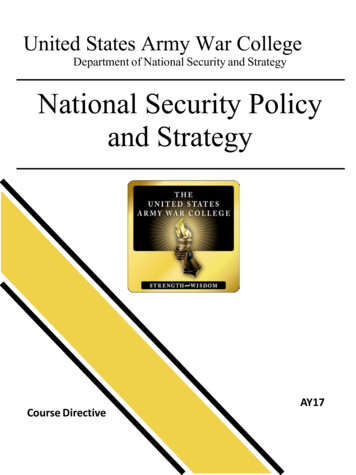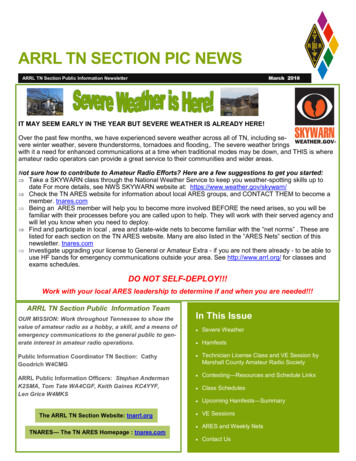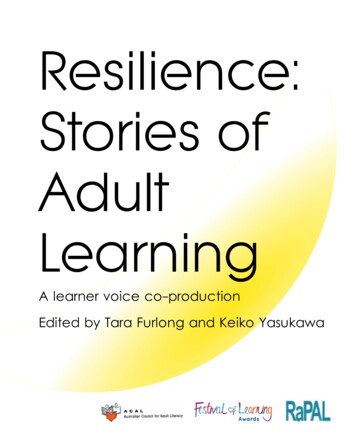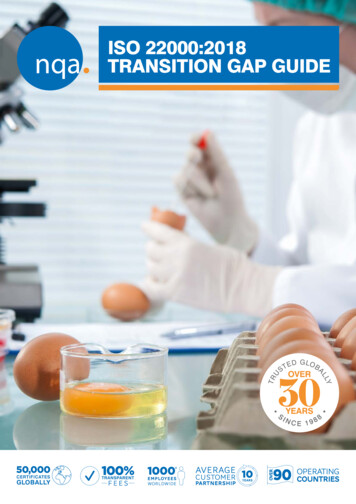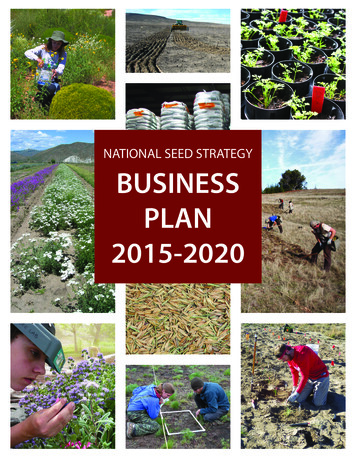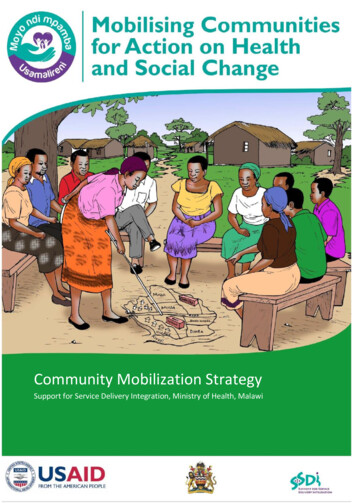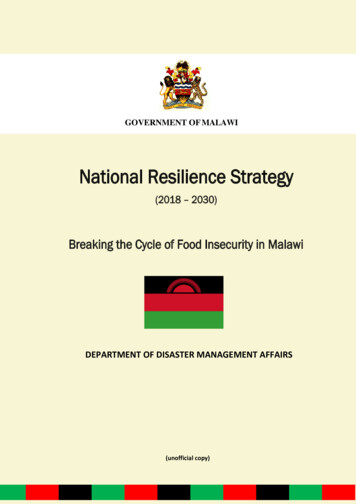
Transcription
GOVERNMENT OF MALAWINational Resilience Strategy(2018 – 2030)Breaking the Cycle of Food Insecurity in MalawiDEPARTMENT OF DISASTER MANAGEMENT AFFAIRS(unofficial copy)i
Table of ContentsAcronymsKey dataStatement by the PresidentJoint Ministerial StatementStatement by DevelopmentPartners 21.31.41.5iiiiivvviviiviiiixSituational AnalysisClimate Resilient DevelopmentNutrition for ResilienceDevelopment – Humanitarian NexusInclusive Growth for Resilience246810VISION AND GUIDING ining ResilienceVision StatementGuiding PrinciplesCommon Programme FrameworkTheory of ChangeLinkage to MGDS III and Integration across NRS PillarsBeneficiary TargetingPOLICY FRAMEWORK253.13.22530National Policy CoherenceInternational and Regional FrameworksNRS PILLARS AND COMPONENTS354.1Pillar 1: Resilient Agricultural Growth364.1.14.1.24.1.34.1.44.1.54.1.6Sustainable Irrigation DevelopmentDrought MitigationAgricultural DiversificationMarket Development, Value Addition, and ExportsStrategic Grain ReserveFarm Input Subsidy Programme383839394040Risk Reduction, Flood Control, and Early Warning and Response Systems44Mainstreaming DRM Across Sectors and Administrative LevelsFlood Prevention and ControlEarly Warning SystemsDisaster Preparedness, Response, and Recovery434444454.2Pillar 2:4.2.14.2.24.2.34.2.4i
4.3Pillar 3: Human Capacity, Livelihoods, and Social Protection4.3.14.3.24.3.34.3.44.3.54.4Pillar 4:4.4.14.4.24.4.34.4.44.4.55.47Overview of the MNSSP IIConsumption SupportResilient LivelihoodsShock-Sensitive Social ProtectionNutrition4850525455Catchment Protection and Management60Integrated Watershed ManagementForest and Landscape RestorationPayment for Ecosystem ServicesSustainable EnergyForest-based Enterprises6161626264MULTI-SECTORAL COORDINATION AND IMPLEMENTATION FRAMEWORK665.1Coordination and Alignment Principals665.2NRS Implementation 6767676868National NRS Governance CommitteeNational, Disaster Preparedness, and Relief CommitteeNational, Disaster Preparedness, and Relief Technical CommitteeJoint NRS Sub-Committees / Working GroupsNRS SecretariatDistrict Councils and Sub-CommitteesBeneficiary and Civil Society Groups6.MONITORING AND EVALUATION FRAMEWORK717.RISK MANAGEMENT73ii
LIST OF 18.Combined Risk of Drought and FloodTrends in Humanitarian Responses to Shock-Affect PopulationsStunting Rates in MalawiMulti-Year Food Insecurity and StuntingClimate-related Shocks and Reducing Fiscal DeficitsFrequency of Shocks by DistrictNRS Theory of ChangeLifting Households Towards ResilienceNational Resilience Strategy: Resilient People, Agriculture, and EnvironmentNational Resilience Strategy: Pillars and ComponentsAgriculture to Nutrition PathwaysMNSSP II Thematic AreasTargeting for Social Support and Protection ProgrammesMalawi SUN Implementation FrameworkForest & Land Restoration PrioritiesFlood Risk & Soil LossRisk Exposure, Drought, and PovertyNRS Implementation Arrangements2579910182326353750515762626368LIST OF TABLES:1. NRS Common Programme Framework2. NRS Integration Matrix3. NRS Geographical Coverage4. NRS Indicative Interventions5. Alignment between NRS and SDGs6. Expected Outcomes of Pillar 17. Expected Outcomes of Pillar 28. Expected Outcomes of Pillar 39. Expected Outcomes of Pillar 410. NRS Governance Framework11. NRS Risk and Mitigation Measures1420212431414659656973ANNEXES:I. Preliminary NRS Common Programme FrameworkII. Monitoring and Evaluation Framework7475iii
PGISGIZGoMHEAHIVIFIFADILOIMPIFIWDIPCAgriculture Commodity ExchangeAgriculture Development DivisionAssistant District Disaster RiskManagement OfficerAgricultural Development and MarketingCorporationAdolescent Girls and Young WomenAfrican Risk CapacityAgriculture Sector-Wide ApproachAcquired Immune Deficiency SyndromeCommunity-based Flood Early Warning SystemsClimate Change AdaptationClimate Change Investment PlanClimate Smart AgricultureCommunity Based Resilience AnalysisCivil Protection CommitteeCivil Society OrganizationDistrict Agricultural Development OfficerDistrict CommissionerDepartment of Climate Change andMeteorological ServicesDistrict Executive Committee(UK) Department for International DevelopmentDepartment of Nutrition, HIV and AIDSDepartment of Disaster ManagementAffairsDepartment of EnergyDepartment of ForestryDepartment of IrrigationDepartment of Nutrition and HIV and AIDSDevelopment PartnerDistrict Planning and Development OfficerDisaster Risk ReductionDepartment of Water ResourcesEnvironmental Affairs DepartmentExtension Planning AreaEuropean UnionEarly Warning SystemFood and Agriculture OrganizationFall Army WormFlood Early Warning SystemFarm Input Subsidy ProgrammeGreen Belt InitiativeGross Domestic ProductGeographic Information SystemDeutsche Gesellschaft für InternationaleZusammenarbeit (GIZ) GmbHGovernment of MalawiHousehold Economy ApproachHuman Immunodeficiency VirusIrrigation FundInternational Fund for Agricultural DevelopmentInternational Labour OrganizationIrrigation Master Plan and InvestmentFrameworkIntegrated Watershed DevelopmentIntegrated Phase ClassificationLDFMALCIDLocal Development FundMalawi Committee on Irrigation andDrainageMDAMinistry, Department, AgencyMGDSMalawi Growth and Development StrategyMIBMalawi Irrigation BoardMKMalawi KwachaMNSSPMalawi National Social SupportProgrammeMoAIWD Ministry of Agriculture, Irrigation, and WaterDevelopmentMoESTMinistry of Education, Science andTechnologyMoFEP&D Ministry of Finance, Economic Planningand DevelopmentMoHPMinistry of Health and PopulationMoITTMinistry of Industry, Trade, and TourismMoGCDSW Ministry of Gender, Children, Disabilities andSocial WelfareMoLGRD Ministry of Local Government and RuralDevelopmentMoLHUD Ministry of Lands, Housing, and UrbanDevelopmentMoTPWMinistry of Transport and Public WorksMNEPMalawi National Energy PolicyMoNREM Ministry of Natural Resources, Energy, andMinesMRCMalawi Red CrossMTMetric tonsMVACMalawi Vulnerability AssessmentCommitteeNANew Alliance for Food SecurityNAIPNational Agriculture Investment PlanNCCMPNational Climate Change ManagementPolicyNCICNational Construction Industry CouncilNDPRCNational Disaster Preparedness and ReliefCommitteeNESNational Export StrategyNFINon-food ItemNFRANational Food Reserve AgencyNGONon-Governmental OrganizationNIPNational Irrigation PolicyNMSNPNational Multi-Sectoral Nutrition PolicyNRSNational Resilience StrategyNSONational Statistics OfficeNWPNational Water PolicyPDNAPost-Disaster Needs AssessmentPPPPublic-Private PartnershipPWPPublic Works ProgrammeSCTPSocial Cash Transfer ProgrammeSGRStrategic Grain ReserveSMPSchool Meals ProgrammeTATraditional AuthorityUBRUnified Beneficiary RegistryUNDPUnited Nations Development ProgrammeUNICEFUnited Nations Children’s Fundi
UPUSAIDUnited PurposeUnited States Agency for InternationalDevelopmentVSLWFPWBVillage Savings and LoanWorld Food ProgrammeWorld Bank2
KEY DATATitleMalawi National Resilience Strategy (NRS): Breaking the Cycle of Food InsecurityDurationPhase I: 2018 – 2022 / Phase II: 2023– 2028 / Phase III: 2029-2030VisionStatementA country free of chronic vulnerability, and food, and nutrition insecurity, where sustainable economicdevelopment creates opportunities for everyone, and where people are resilient to economic andenvironmental shocks that affect their lives and livelihoods.Overall OutcomeMalawi is resilient to economic and environmental shocks and able to sustain inclusive growth, food andnutrition security, and improved well-being for all Malawians. The country has transitioned from recurrenthumanitarian appeals to protective and productive investments in complementary interventions targetingchronically food insecure and poor households, supported by effective institutional coordination and multisectoral planning and implementation.1. Transformed agricultural sector into an engine for shared economic prosperity, food security and povertyreduction;2. Scaled-up climate-resilient infrastructure, and enhanced climate-adaptation capacity of all stakeholders,through better access to climate information and early warning and response mechanisms thatsafeguard lives and livelihoods from shocks;3. Sustained reduction in the number of chronically food insecure households by scaling up access topredictable social support services, complementary livelihood packages, nutrition services, andexpanded access to national programmes;4. Reduction in stunting of children 5 years of age through well-coordinated and high-impact multisectoral investments in nutrition-specific and nutrition-sensitive interventions;5. Expanded public, private and community partnerships to safeguard Malawi’s natural resourceendowments and ecosystems that contribute to social and economic prosperity;6. Strengthened national and devolved government institutions, civil society, and private sector actors toadopt effective and accountable practices that prevent, mitigate, and respond to disasters, and promotelong-term development;7. Strengthened women’s empowerment through cross-cutting strategies and measurable outcomes.a) Percentage reduction in extreme poverty.b) Prevalence and depth of food insecurity (measured by Food Insecure Experience Scale (FIES).c) Reduction in number of people requiring emergency food and cash assistance as a result of flood,drought, and other emergencies, disaggregated by gender.d) Return on investment, money and livelihoods saved from averting food and nutrition crisis compared topast crises.e) Percentage of poor Malawians graduated from the social safety net transfers through protective andproductive asset creation and cash transfers, disaggregated by gender.f) Percent of poor Malawians living above the poverty line who do not backslide into poverty, disaggregatedby gender.g) Percentage annual growth in agriculture GDP.h) Percentage increase in availability, access, quality, and affordability of recommended food groups inlocal and regional markets.i) Percent increase in hectares managed through integrated watershed development practices (protectiveforest cover in priority catchments).j) Annual reduction in percent of children 5 years of age stunted.k) Percent reduction in anaemia in children 5 years of age and women of childbearing age.l) Percent change in Women Empowerment in Agriculture (WEAI) Score (mean empowerment gap).m) National and devolved government institutions implement coordinated multi-sectoral plans supportingNRS priorities.n) Optimal funding levels for multi-sectoral programmes and sector-specific programming in NRS priorityareas are allocated by the GoM Treasury and Development Partners (priority areas defined duringimplementation) 319,000 ultra-poor, labour-constrained, and vulnerable households across all 28 districts. 15% of poor households in all 28 districts. Up to 50% of household population with lowest welfare status. Areas the most vulnerable to recurrent crisis based on multi-criteria mapping: priority drought-proneareas, catchments and flood hotspots, irrigation sites, degraded ecosystems, and non-grid connectedhouseholds without energy access.Combined PillarImpactsIndicators (alldisaggregatedby gender andage)Target Areasand Populationiii
Statement by the PresidentThe National Resilience Strategy (NRS) represents apivotal shift in the way our country will address povertyreduction, food and nutrition security, and inclusiveresilient growth for all Malawians.For too many years the people of Malawi have cycled inand out of seasonal and multi-dimensional poverty. In2016-17, over 40% of the population neededhumanitarian assistance, which had devastatingimpacts on livelihoods, nutrition, and our progress toexpand inclusive economic growth as outlined in theMalawi Growth and Development Strategy III. It isimperative that the GoM, its partners, and citizensreignite our ambitions and actions as we collectivelydeal with the increasing, more frequent, and risingseverity of extreme weather events linked to climatechange.Malawi’s commitment to achieve theSustainable Development Goals (SDGs), Agenda 2030,and Agenda 2063, remains steadfast.Malawi is eager for more predictable and productiveinvestments that address vulnerability and risk, andbuild resilience at the household and systems levels sothat people can build healthy and productive lives andnourished families, free from poverty. I want Malawi’syouth to have food in abundance, education, andgainful employment so they can prosper and build thefuture of the country. I want to see our farms prosper,our markets overflow, and our environment protectedfor all to enjoy. When the next emergency arrives, I wantto see all our systems respond effectively, from thenational level down to communities who are mostaffected.It is with this vision that I endorse the NRS as aninstrument of change. The NRS is the first Governmentled multi-sectoral strategy to be managed under acommon framework for implementation, coordination,and monitoring, evaluation, and learning. The strategycalls on all Ministries, Development Partners, andstakeholders to plan strategically to achieve collectiveresults.The NRS recognizes that building resilience depends onan enabling environment that propels agriculturalgrowth. Agricultural investments must increaseproductivity and diversity in local and regional markets,while driving exports. Diversification and integration ofnutrition-sensitive interventions are imperative in theface of climate change, and for nutritious andsustainable diets. Agricultural growth will stabilizeprices, increase productivity, and mitigate shocks.Sustaining such growth requires effective disaster riskreduction and response systems through coordinatedinvestments in flood control, drought mitigation, andhigh functioning early warning and response systems.Shock-sensitive and nutrition-sensitive social protectionwill protect the most vulnerable.The Malawi National Social Support Programme II laysthe foundation for vulnerable groups to meet basicneeds, while embarking on a path of resilient growththrough asset creation, access to education, highervalue agricultural livelihoods opportunities, andincreasingly in the service sectors. Livelihoods growthwill impact all pillars of the NRS through job creationand skills building in agriculture, nutrition, theenvironment, and renewable energy,. Well-managedurbanization will also build Malawi’s resilience.Investments in optimal nutrition services are alsointegral to the NRS, and will scale up nutrition-specificand nutrition-sensitive activities.Investments in catchment protection, forestry, ruralelectrification, renewable energy, and climate financingwill protect and sustainably manage natural resources,and generate jobs, particularly for our youth.I champion and stand behind the NRS, and expect towitness real change. I therefore call on the LeadGovernment Ministries, and all other Ministries,Development Partners, stakeholders, private sector,and citizens, to rally behind the NRS by taking action,and working together to achieve the vision of a moreresilient, healthy, and prosperous Malawi.The NRS creates the coordination framework and themomentum needed to ensure that sectoral activities May God Bless Malawi and its People.are effectively achieve impact, furthering Malawi’sprogress to meet the SDGs in 2030.His Excellency Peter Arthur Mutharikaiv
President of the Republic of Malawiv
vi
Joint Ministerial StatementWe wish to express our gratitude to His Excellencythe President, Professor Arthur Peter Mutharika, forbeingthechampionoftheNationalResilience Strategy.We also extend ourappreciation to officials in the Department ofDisaster Management Affairs for driving the effortsto develop the NRS in the wake of extreme droughtsand floods, and the seasonal food securitycrises Malawi continues to face.We wish to affirm our support to theNational Resilience Strategy, and underscore ourcommitment to work together to achieve itsobjectives. Under the MGDS III, our Ministries areeager to join forces with Development Partners andall stakeholders to put the NRS into action.We embrace the change required to continueto work together to achieve more profound andmore sustainable results to strengthen resilience.The continuous cycle of food and nutrition insecurity,coupled with the increasing threat of climatechange, are holding Malawi back from achievingreal and sustained development gains. Whileurbanization is increasing in Malawi, ruraldevelopment and agriculture will continue to bethe main drivers of Malawi’s development over thenext 15 years, and is thus foundational to thesuccess of the NRS, and reaching our vision of:“A country free of chronic vulnerability, food andnutrition insecurity, and where sustainableeconomicdevelopmentcreates opportunitiesfor everyone, and where people are resilient toeconomic and environmental shocks that affect theirlives and livelihoods”.We recognize that the NRS aligns with the MGDS III,the Malawi Social Support Programme II, theNational Agriculture Investment Plan 2017/182022/23, the National Multi-Sectoral Nutrition Policy2017-2022, the National Climate Change Policy,2016, the National Gender Policy, and all supportingpolicies and strategies that guide our core NRSdevelopment investments in Malawi.While our sector policies and strategies all aim tobreak down vertical silos, we acknowledge thebenefits of making greater strides in jointimplementation approaches and integrated servicedelivery, with a view to reducing fragmentation andimproving the effective channelling of human andfinancial resources to support and sustain householdand system-level resilience in NRS priority districts.In the spirit of this pivotal change in approach, wetherefore embrace a new, and more robust andcoordinated way of working guided by the NRSCommon Programme Framework (CPF). Wechampion this effort to apply NRS geographic,technical, and beneficiary targeting criteria, andintentional multi-sectoral design. The CPF will serveas a guide for prioritizing, coordinating, andchannelling resources across sectors that will ensuregreater collective and measurable outcomes. It willalso serve as a vehicle for enhanced learning,documenting the evidence base, and scaling upsustained pathways out of poverty, climateresilience, and economic growth.In keeping with the statement of support from HisExcellency the President, we therefore commit toraising the bar, and stand ready to work together withour Development Partners, local organizations, andcivil society to drive the NRS agenda forward.We are committed to the additional investmentrequired in management, multi-sectoral design,coordination, and monitoring and evaluation, andlearning required for successful implementation ofthe NRS vision. Accelerated growth and progresstoward increasing resilience requires coordinatedinvestments in agriculture, disaster risk reduction,early warning, preparedness and response, humancapacity, livelihoods, and nutrition, and climatechange. Working together, we will achieve theobjectives of the MSDG III and move closer toreaching the 2030 Sustainable Development Goalsfor a more productive, competitive, and resilientMalawi.Honourable Goodall Gondwe, Minister of Finance, Economic Planning, and DevelopmentHonourable Joseph Mwanamwekha, Minister of Agriculture, Irrigation, and WaterDevelopmentHonourable Jappie Chancy Mhango, Minister of Transportation and Public WorksHonourable Aggrey Masi, Minister of Natural Resources, Energy, and MiningHonourable Jean Kalilani, Minister of Gender, Children, Disability, and Social WelfareHonourable Atupele Muluzi, Minister of Health and PopulationHonourable Kondwani Nankhumwa, Minister of Local Government and Rural DevelopmentHonourable Henry Mussa, Minister of Industry, Trade, and TourismXXX, Minister of Education, Science, and Technologyvii
Honourable XXX, Minister of Lands, Housing, and Urban Developmentviii
Statement by Development PartnersOn behalf of development partners in Malawi, wewelcome the National Resilience Strategy andcongratulate the Government for embarking on thislong-term process to address the structuralvulnerabilities affecting poor people’s lives,contributing to chronic and acute food insecurity,and hampering progress on inclusive growth. Wewelcome the commitment by all governmentministries, departments, and agencies to chart anew course for a more resilient and food secureMalawi.As the government finalizes the Malawi Growth andDevelopment Strategy III, development partners areof the view that Malawi is poised for a pivotaldeparture from the cycle of annual appeals foremergency food assistance. To support thisprocess, the NRS serves as a common platform fora broad-based coalition committed to a foodsecure, resilient, and prosperous Malawi.We welcome that the NRS is anchored on a multisectoral and multi-stakeholder approach that isstrongly led and owned by government.Stakeholders recognize that the way in which wework has not always led to the changes we seek.As the frequency and intensity of weather-relatedhazards is likely to increase, this trend leaves littleroom for households to recover and rebuild theirlivelihoods. Programmes and projects to buildhousehold resilience among the most vulnerablehave tended to be developed in isolation fromeach other, and not always fully aligned with, or ledby, Government. While their benefits are oftenpositive at the community level, they have notbeen designed or delivered on a scale whichfacilitates sustainable, transformative impactsacross all of Malawi.Development partnerstherefore welcome this common strategy to guideprogramming, and we believe that it provides aplatform to achieve much greater impact on thelives of vulnerable people.The NRS emerged from dialogue initiated at theDevelopment Cooperation Group and High-LevelForum in 2016 among stakeholders deeplyconcerned about breaking the cycle of foodinsecurity in Malawi.A discussion paper formulated by theDepartment of Disaster Management Affairs(DoDMA), and subsequent exchanges, led posedof representativesfrom government, civil society, academia, theprivate sector, and development partners.These sub-groups gave shape to the NRS.While the NRS reflects existing policiesand strategiessuchastheClimateChange Management Policy, Irrigation MasterPlan and Investment Framework, and NationalAgricultural Policy, it was formulated in parallelwith Malawi Growth and Development Strategy(MGDS) III, the National Agricultural InvestmentPlan, and the new Malawi National SocialSupport Programme, and the National MultiSectoralNutritionPolicy. Accordingly, wewelcome the phased approach that will enablestakeholders to maximize linkages across theNRS pillars as well as with these importantstrategies, plans and programmes.The NRS reflects Malawi’s commitmentto contributetowardsthemomentumemerging acrossAfrica,wherenationalgovernments are strengthening the resilience ofthe most vulnerable through coordinated multisectoralhumanitarian anddevelopmentapproaches,integrating agricultural growth,adaptation to climate change, social protection,livelihoods, nutrition, and disaster risk reduction.Bystrengtheningthelinkagesbetweenthese communities of practice, Malawi willadvance its delivery of the SustainableDevelopment Goals, Agenda 2030, and Agenda2063, as well as the New Alliance for FoodSecurity and Nutrition, the Sendai Frameworkfor Disaster Risk Reduction, and the ParisAgreement on climate change.Meeting the objectives contained in the NRS willrequire new ways of working, a commitment tojoined up programming, robust metrics tocollectively monitor our results over time, and strongmeasures for effective governance. Developmentpartners stand ready to support national actors toput the NRS into action.Mia SeppoUnited Nations Resident Coordinator, andix
Resident Representative of UNDPx
AcknowledgementsThe National Resilience Strategy is a product of various actors in government, non-governmentalorganizations, and development partners. The commitment of all involved, and the goodwill andcollaborative spirit shown throughout the process, are warmly appreciated. Special thanks go to officers atthe Department of Disaster Management Affairs for coordinating the process. The success of the NationalResilience Strategy reflects the collective effort by implementing ministries and departments at districtlevel, supported by enabling policies. This Strategy is premised on the principles of division of labour anddoing business unusual. It is motivated by the conviction that Malawi must accelerate its transition to afood and nutrition secure future by tackling chronic poverty, accelerating agricultural growth and economicopportunity, protecting households from shocks, and reducing disaster risk in the context of a changingclimate. By working together, implementation of the National Resilience Strategy will contribute to Malawi’sachievement of the Sustainable Development Goals. Support from the following organizations is gratefullyacknowledged.C.C. PhiriSecretary to the Vice-President and Commissioner for Disaster Management --------------------------------------- African Development Bank International Food Policy ResearchInstitute Catholic Development Commission Lilongwe University of Agriculture and Centre for Environmental Policy and AdvocacyNatural Resources Civil Society Network on Climate Change Ministry of Agriculture, Irrigation, and Water Debt and Aid Division (MoFEP&D)Development Department of Agricultural Extension Ministry of Education, Science, and TechnologyServices Ministry of Finance, Economic Planning, and Department of Climate Change andDevelopmentMeteorological Services Ministry of Gender, Children, Disability, and Department of CropsSocial Affairs Department of Energy Ministry of Health Department of Environmental Affairs Ministry of Natural Resources, Energy, and Department of FisheriesMining Department of Forestry Ministry of Transport and Public Works Department of Irrigation Secretary to the Treasury Department of Nutrition, HIV and AIDS Poverty Reduction and Social Protection Department of Planning (MoAIWD)Division Department of Water Resources Trocaire European Union UK Department for International Development Food and Agriculture Organization United Nations Children’s Fund German Development Cooperation United Nations Development Programme Global Centre for Resilient Ecosystems and United PurposeDesertification United States Agency for International Government of Germany, through KfW andDevelopmentGIZ World Bank Group Green Belt Authority World Food Programme International Labour Organization World Vision Malawixi
Preamble1.1Whereas the Government of the Malawi is committed to implementing the Malawi Growth andDevelopment Strategy III to build a competitive, productive, and resilient nation.1.2Whereas realizing the goals of MGDS III requires significant investments to enhance food and nutritionsecurity and reduce the vulnerability of poor people in rural and urban areas to shocks that affect their ability toimprove their quality of life.1.3Whereas Malawi continues to register a substantive number of people requiring recurrent humanitariansupport regardless of whether the country registers surplus food production, and witnesses an increase in thenumber of food insecure people (from 2007-2011 annual average of 350,000 increasing to 1,700,000 overthe 2012-2014 period, and more than 6.7 million over 2016-17).1.4Whereas the lack of clear differentiation between chronic and acute food insecure caseloads hasresulted in the use of humanitarian appeals to address chronic problems, perpetuating responsive overpreventative approaches, and continues to divert scarce human and organizational capacity and financialresources from productive investment.1.5Whereas more than 90 percent of national food production relies on a single rain-fed cropping seasonamong smallholder farmers, making the agricultural sector characterized by low productivity, lack ofpredictability with high risks to climactic and other shocks.1.6Whereas climate change and population growth are increasing exposure to risk and pressure onfarming and food supply systems, leading to smaller land holdings, less sustainable livelihoods, deforestation,and depleted soils.1.7Whereas breaking the cycle of food and nutrition insecurity requires an enabling economicenvironment, sustained and predictable access by vulnerable households to well-targeted livelihood supportpackages, increased transparency on resource use and programme delivery, and guidance to all stakeholdersoperating under a common framework.1.8Whereas, the Government is committed to achieving the Sustainable Development Goals andimplementation of the New Alliance for Food Security and Nutrition, and has launched the Agricultural Policy,National Export Policy, National Irrigation Policy, National Environmental Policy, Climate Change ManagementPolicy, National Nutrition Policy, National Forestry Policy, National Water Policy, National Social Support Policy,and is formulating its National Meteorological Policy, National Forestry Policy (2016), National Disaster Risk Act,and other key policies, strategies and plans.1.9Whereas, the Government is committed to promoting coherence in the implementation of these policiesand strategies, new approaches are needed to address key barriers to achieving sustained poverty reduction toaddress chronic and acute food and nutri
National Resilience Strategy: Resilient People, Agriculture, and Environment 26 . GIS Geographic Information System . GIZ Deutsche Gesellschaft für Internationale . Zusammenarbeit (GIZ) GmbH . GoM Government of Malawi . . severity of
